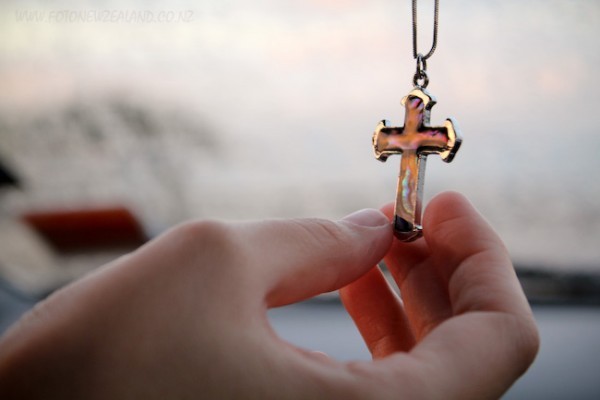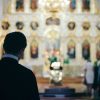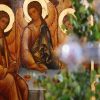Science has given us many miracles. Most recently it produced in a short time several highly effective vaccines against the corona virus. It is amazing that nature is governed by stable mathematical rules and forces which can be engineered for the benefit of humanity. It is even more amazing that certain creatures on earth, whom we call human beings, have the gift of intelligence to discover and then employ those mathematical rules and forces to develop life-saving medicines. Each new discovery seems to open new windows into the depths of the mystery of life. Who could not consider this great mystery itself to be a sign of the presence of a Supreme Mind? Who could not contemplate the possibility that God is behind the harmonious order of things and the creative ability of human beings, who are gifted with the capacity to be co-creators with God?
Today’s Gospel reading from Matthew (Mat 14:22-33) tells of another miracle in the mystery of life. Jesus reveals Himself to be the master of the winds and waves. Theologians call that event a theophany, an awesome disclosure of the divine presence. Christ reveals in a veiled way His divine origins and attributes. He comes to His disciples walking on the water. They were in a boat, tossed here and there by winds and waves. Christ comes to help them. He calms the raging sea and pacifies their terrified emotions. “Take heart, it is I; have no fear,” He says. In response they worship Him and offer a confession of faith: “Truly You are the Son of God.”
Jesus walking on the water! How could such a thing be possible? How could the law of gravity be defied? What was its purpose? From the standpoint of the Bible, the event is related to themes and actions of God in the Old Testament. These actions speak of God as Creator who rules over the elements of nature. For example, Psalm 77 refers to the exodus of Israel from Egypt. It describes the crossing of the Red Sea with these words: “You are the God who works wonders . . . Your way was through the sea, your path, through the mighty waters; yet Your footprints were unseen” (Psalm 77:14, 19). For the early Christians, the ministry of Jesus was a new exodus. It was a time of divine signs and wonders. The new exodus showed that Christ rules over the winds and the waves. Christ is the Lord of creation and if so, He has the power with purposeful intention to override the laws of nature itself.
Many today would greet the story of Jesus’s walking on the water with skepticism. If you sincerely find it hard to believe in this miracle, do not let your doubt turn into guilt. Know that God respects honest doubt, if you sincerely seek Him and desire to do His will. God has given us minds to search for the truth. He would have us approach stories of miracles with a touch of questioning rather than credulity. Also, let us remember, that Christ did not put forward His miracles as the most important part of His work. Miracles were “signs” and not “proofs” of His Messiahship. Faith remained always essential in the response to Christ. The foremost miracle is Christ Himself in His divine presence and beauty, His goodness and love for you and me, His call to us to carry on His mission for the salvation of souls in whatever place and whatever situation God has put us here on earth.
In the Scriptures, the winds and waves of the sea symbolize the winds and waves of life. Winds and waves become metaphors for the risks and perils of life. They insinuate the ever-present risk of chaos, sin and death. The little band of disciples, symbolizing the Church, were all in the boat tossed about by the storm in the middle of the night. When all hope seems lost, Jesus reveals Himself as Lord, rescues them from impending peril, and re-assures them by His divine presence. Christ is likewise the great rescuer of humanity from the forces of evil which buffet humanity. Christ calms the spiritual storms of life and brings peace to those who follow Him and practice the ways of His kingdom.
All this symbolism finds its focus in the person of St. Peter, the leader of the Apostles. When Peter saw Christ walking on the water, he was emboldened and tried himself to walk on the water. He was successful until, taking his eyes off Christ and looking at the menacing elements, he began to sink. “Save me, Lord!” he cried out in desperation. Jesus reached out to him, grasped his hand and pulled him out from the waters of death, saying to him, “O man of little faith, why did you doubt?” In my office I have a favorite icon depicting Christ reaching out to Peter and pulling him out of the water.
In recent days, the confidence of our nation is sagging. Its soul is being tried by the chaos and humiliation of the loss of the war in Afghanistan. The scenes from Kabul Airport are heart-breaking. It is a bitter pill to swallow for America on account of repeated mistakes by political and military leaders over twenty years. And yet to sink into the waters of woe and divisive political recriminations is not at all helpful. This is a time for renewed faith in God and also for hard thinking about America’s leadership. What is it about the character of America that makes it truly great? Surely it is not only wealth and military might which have their limits, as we have seen time and again. Rather it is our faith in God and the never-ending pursuit of more genuine forms and practices of education, health, justice, scientific advancement, public service, climate management and economic opportunity for all people. Let us seek excellence in these matters. Then America is true to itself, a light to other nations, a wise and generous member of the international community.
There are times in a believer’s life, too, filled with pain and peril, when the only answer are absolute faith and Peter’s prayer: “Save me, O Lord!” I know I have had more than one sinking experience in my life. In a time to testing, I was careless and had gained some weight. My apoiea worsened. Unable to get fitful sleep, my heart began to act up. In a word, although carrying on doggedly, I was miserable, depressed, feared the dark, and expected at any moment to have of a stroke or a heart attack. Like Peter, I was sinking in troubled waters. But I never gave up. A verse from the Psalms says: “Lord, stretch out your hand from on high; and set me free from the mighty waters” (Psalm 144:7). That was my faith, my prayer, my hope.
And the Lord did not let me sink and drown, thankfully. He did His work in His own way. I learned I could not walk on water, certainly not on my own powers. It took adjustments in my life and a more careful diet. It took encouragement and loving support from family, friends and parishioners. At the center of it was Christ and comforting moments of the Lord’s grace. As the clouds began to disperse and the sunshine began to return, there came a new awareness of the importance of faith and the practice of prayer, as Jesus often pointed out. I note that in today’s Gospel, and prior to the appearance to His disciples, Jesus wanted to be alone; He took to the hills, and spent most of the night in prayer, just as it was His habit to do (Mat 14:23; Mark 1:35; Luke 5:16).
In one of our communion prayers we say, “It is good for me to cleave unto God and to place in Him the hope of my salvation.” Here is a quote from St. John Chrysostom on the theme of clinging to Christ and never letting go:
“Let there be no gap between us and Christ. For if there is any gap, immediately we perish . . . Let us not then merely keep hold of Christ, but let us be cemented to Him . . . Let us cleave to Him by our works. ‘For he who keeps my commandments, the same abides in Me’ (John 14:21) . . . Christ is the Head, we are the body. He is the Foundation, we the building. He is the Vine, we the branches. He is the Bridegroom, we the bride. He is the Shepherd, we the flock. He is the Way, we they who walk in it. Again, we are the sanctuary, He is the Indweller. He is the Only Begotten, we His brothers and sisters. He is the Heir, we the heirs with Him. He is the Life, we the living. He is the Resurrection, we those who rise again. He is the Light, we the enlightened.” (St. John Chrysostom, Homilies n 1 Corinthians, 8.11).
To Christ, the Lord and Savior, be all the honor and glory forever. Amen.

















